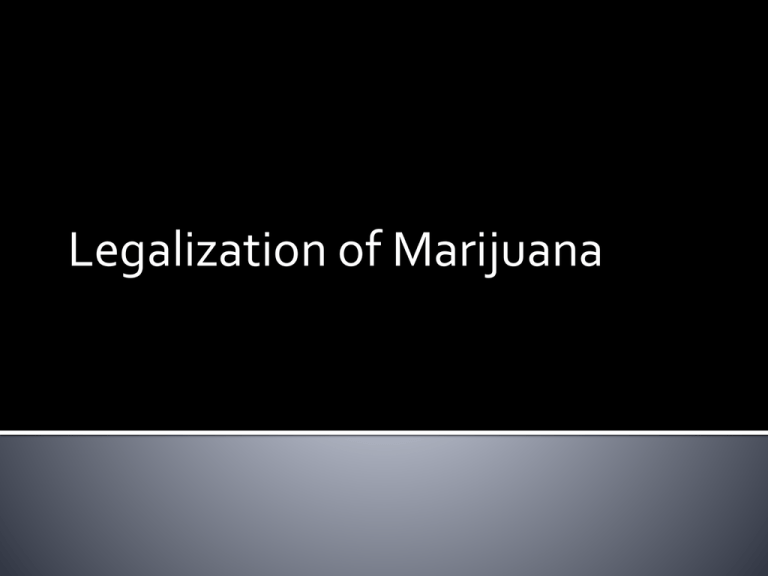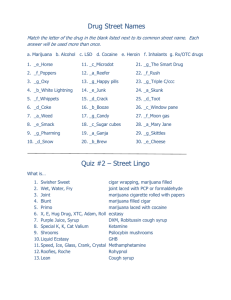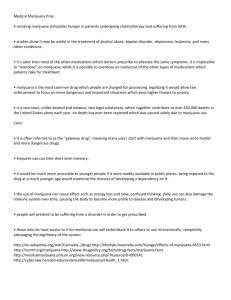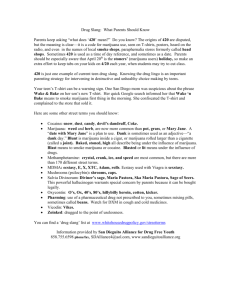Slide 1
advertisement

Legalization of Marijuana Should Marijuana be legalized under any circumstances? Should Marijuana only be legal for medicinal purposes? Should Marijuana be illegal under any circumstance? For most of human history, marijuana has been legal Uses go back further than 7000 B.C. Hemp plant has number of uses: woven fabric, food, incense, cloth, rope, etc Did not reach public awareness as a recreational drug until early 1900’s First marijuana law enacted at Jamestown Colony, Virginia in 1619 Law “ordered” farmers to grow Indian hempseed United States Census of 1850: 8,327 hemp “plantations” (minimum 2000 acre farm) growing hemp for cloth and canvas 1913: California passes first state marijuana law- referred to “preparations of hemp or loco weed” Marijuana Tax Act of 1937 Became illegal at federal level 16 states have laws that legalized medical marijuana: Alaska, Arizona, California, Colorado, Delaware, Hawaii, Maine, Michigan, Montana, Nevada, New Jersey, New Mexico, Oregon, Rhode Island, Vermont, Washington, D.C. “The accumulated date indicate a potential therapeutic value for cannabinoid drugs, particularly for symptoms such as pain relief, control of nausea, and vomiting, and appetite suppressions.” Institute of Medicine’s 1999 report Institute of Medicine 1999 Would marijuana diminish patients’ immune system- important to consider with AIDS and cancer patients “the short term immunosuppressive effects are not well established but, if they exist, are not likely great enough to preclude a legitimate medical use.” 1. The drug generally isn’t more harmful than alcohol or tobacco if used in moderation Studies about harmfulness are inconclusive and contradictory Many doctors will say it’s not very harmful if used in moderation Abuse of the drug that causes problems Should government limit how much coffee we can drink or how much cheesecake to eat? 2. Limiting the use of the drug intrudes on personal freedom Isn’t it the right of every person to choose what harms him or her? Only the user is harmed- people disagree about what’s considered “moral.” 3. Legalization would mean a lower price; thus, related crimes (like theft) would be reduced Illegal drugs are higher in price because the production, transportation, and sale of the drugs carry heavy risks When people develop drug habits or addictions, they must somehow come up with the money to support their cravings. Unless a person is wealthy, he or she must often resort to robbery and other crimes to generate the money needed to buy the drugs. Legalization would reduce the risks and thus reduce the prices. There would therefore be less need for the secondary crimes needed to raise money 4. There are medical benefits such as those for cancer patients Number of medical benefits of marijuana, most notably in the treatment of patients undergoing chemotherapy. Others believe it helps in the treatment of depression. Certain states have brought initiatives to legalize the drug for at least medicinal purposes 5. Street justice related to drug disputes would be reduced If someone in the drug trade screws you over, there’s no police to call or lawyers to litigate. You must settle disputes yourself. This often leads to cycles of retaliatory violence. 6. It could be a source of additional tax revenues. An enormous amount of money is raised through government taxation of alcohol, cigarettes, and other “sins” The legalization of marijuana would create another item that could be taxed. 7. Police and court resources would be freed up for more serious crimes Many consider the War on Drugs an expensive failure DEA, FBI, border security, police officers, judges, public defenders, prosecutors, juries, court reporters, prison guards, etc Legalization of marijuana would free up those people to concentrate of more important things like terrorism, harder drugs, rape, murder, etc. 8. Drug dealers (including some terrorists) would lose most or all of their business Big opponents of legalizing drugs are the drug dealers themselves. They make their enormous sums of money because of the absence of competition and the street prices 9. The FDA or others could regulate the quality and safety of drugs Many drug users become sick or die because of poorly prepared products Government could oversee production and regulate sales Like sex, coffee, alcohol, or cigarettes, marijuana is one of life’s little pleasures for some people potentially harmful if abused Even legal substances like pizza and donuts can be harmful if not consumed in moderation Would you want someone else telling you what you can and can’t have when it is only your body that is affected? 11. Drug busts often trap young people in a flawed system that turns them into lifelong criminals Impressionable teen tired of earning minimum wage, poor area, needs to save money for college- paid to carry drugs across town If kid is busted- thrown in jail, spends time and becomes friends with other delinquents Defends himself to other inmates Job and college prospects slammed because of felony, then starts life of crime since strapped for cash 1. Marijuana is often used as a stepping stone drug, leading to heroin, cocaine, or other harder drugs Marijuana use often progresses to use of harder drugs People experiment People will turn to harder drugs like heroin, LSD, cocaine, etc after a bigger “high” is sought 2. Stoned driving and other dangers would be increased Marijuana use isn’t truly a “victimless crime” when you consider all of the crimes that may be committed when the user is under the influence of the drug Drunk driving is still a major problem in our society despite all the education and stiff penalties “driving high” would be even harder to detect Unless the user has been smoking in the car, it isn’t as distinctive as drinking Also, there is the possibility the lapse in judgement caused by drug use will lead to harder crimes like rape or robbery 3. Some consider use of the drug as morally wrong Many religions and moral codes prohibit the use of intoxicating substances. Marijuana is generally considered to fit into this category 4. Legalization would increase the chances of the drug falling into the hands of kids Even unhealthy legal items such as cigarettes and alcohol are prohibited from being sold to kids Kids generally don’t exhibit the same reasoning, responsibility, and judgment of an adult Bodies aren’t equipped to handle the intake of these substances Developing brains and bodies can be dealt serious blows by use of marijuana Anytime you make something legal, you increase accessibility to children Kids and teens get their hands on alcohol and cigarettes- we shouldn’t let the same thing happen with marijuana 5. Because of drug related arrests, people who have committed or are likely to commit more serious crimes can be taken off the streets People who produce, sell, traffic, or use illegal drugs have already established themselves as people who will break the law Anyone who commits drug related felonies isn’t likely to be constrained in committing other felonies, such as robbery, rape, murder, etc If such people are in prison because of drug charges, they aren’t able to go out and commit other crimes Also, it often occurs that there isn’t enough evidence to imprison felons for the serious crimes like murder; however, if they can be imprisoned for something, society is better off. At a minimum they will be off the streets, unable to wreak havoc 6. Physical damage would be done to users that abuse the drug Although some studies have been disputed, marijuana abused has been tied to brain damage, cancer, lung damage, depression, amotivational syndrome, and even death Brain damage has been shown to cause memory loss, difficulty in problem solving Government duty to protect the public from such dangerous drugs 7. More widespread use would increase the dangers of secondhand smoke damage to bystanders Common sense tells us that more widespread usage of marijuana increases the likelihood that other people would suffer the damage of inhaling other people’s smoke Public places like bars would expose innocent patrons In the home, siblings, roommates, kids, and spouses would all face increased exposure Health damage to society becomes exponential Possession: Ranges from minor misdemeanor to a 2nd degree felony (less than 100 g all the way to 20,000 g or more is in range) Incarceration can range up to 2-8 years Fines can be from $100 to $15,000 Cultivation: can be a minor misdemeanor if less than 100 g and a fine of $100 all of the way to a 2nd degree felony for 20,000 g or more, and a 2-8 year sentence (with a mandatory minimum sentence) and a fine of $15,000 Sale/Distribution 20 g or less is a minor misdemeanor, and a $100 fine, anything above that is a felony, and jail time of 6-18 months, 1-5 years, etc. Drug convictions cause driver’s license suspension for 6 months to 5 years

![[H1]Researching Society with MicroCase Online](http://s3.studylib.net/store/data/007737973_2-9d35b9e42208c660471ccaa373bd3b78-300x300.png)




